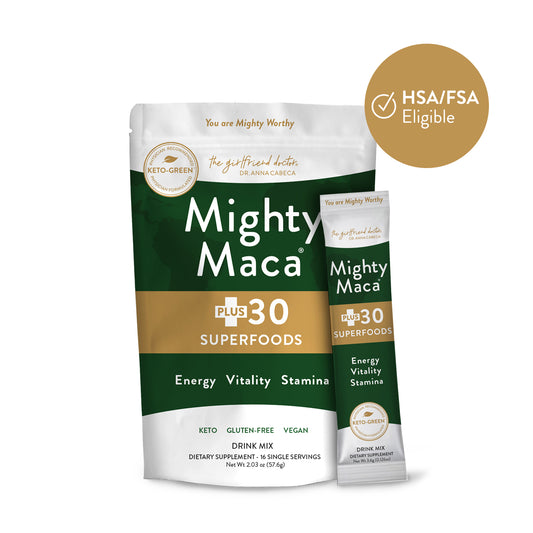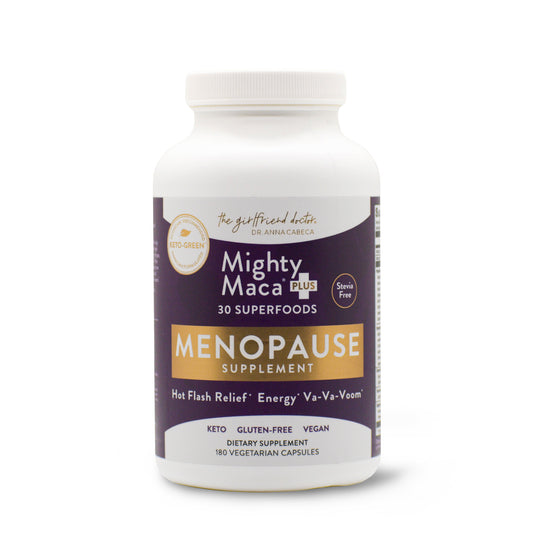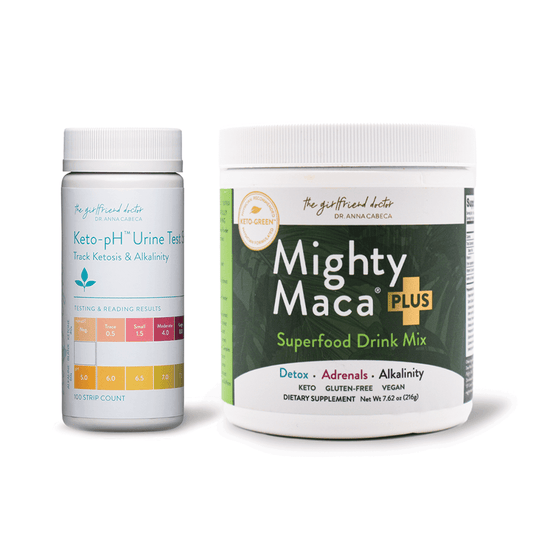In this blog it's the men's turn!

And yes, estrogen will still be an important topic…even for you men…but let’s start with the male hormone that you are most familiar with, Testosterone.
Low T is a Common Male Issue (which is commonly ignored)
Yes, “Low T” is a very prevalent issue. In a stat that I have from 2011, an estimated 13 million men in the US had Low T issues. I’m sure that stat is much larger today.
Yet, only a handful (5-10%) of men typically seek treatment for low testosteronesymptoms.
A lot of men take Viagra, but Viagra is prescribed specifically to address erectile dysfunction only…it doesn’t address low testosterone issues. Erectile dysfunction (ED) is just one symptom of Low T, and in fact, ED can also be caused by other things, such as medication.
While Low T is known for causing erectile dysfunction, a lower sex drive and reduction in sperm; low testosterone is a risk factor for many other health conditions and diseases, including obesity, diabetes and heart disease. Low T may also be a risk factor for cognitive decline and possibly for Alzheimer’s type dementia.[i]
Testosterone has many beneficial health functions as the following chart illustrates.
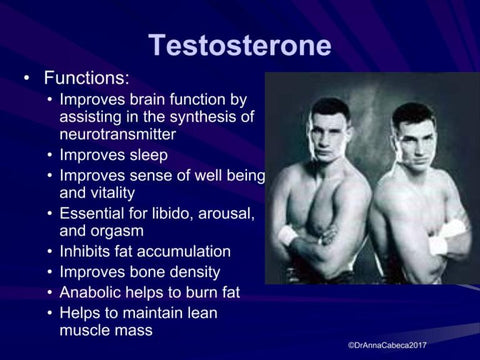
Low T Results in Significant Health Symptoms
As free testosterone peaks in a man’s 20’s and gradually declines (declining 1% per year after age 30), he may start to see a wide variety of symptoms (anyone think they look a lot like the key symptoms seen in menopause?).
- Brain fog and fatigue
- Night sweats (testosterone is important to a good night’s sleep!)
- Mood swings
- Increase in abdominal fat (testosterone inhibits fat accumulation!)
- Elevated cholesterol
- Anxiety and irritability
- Increased risk of insulin resistance
- Osteopenia/osteoporosis (testosterone improves bone density)
- Depression
- Decreased stamina
- Decreased muscle mass (testosterone helps maintain lean muscle mass)
- Decreased mental ability (testosterone synthesizes neurotransmitters so improves brain function!)
- Decreased erection (testosterone is essential for libido, arousal and orgasm!)
- Decreased urine flow
These are all symptoms men can experience with low testosterone, and are considered part of “andropause” (yes, male menopause does exist!).
Testosterone is Only Part of Men’s Sex Hormone Balancing Act
Testosterone is a hormone found in both men and women (surprise!). In men it is primarily made by the testicles. In both men and women it is made in a much smaller amount by the adrenal glands, and in women, it is also made by the ovaries.
Testosterone is important to sexual function in both men and women. In boys going through puberty testosterone causes the boy to become more muscular, to grow facial and body hair, develop a deeper voice, and to make sperm.
Most of the testosterone in the blood is bound to a protein called sex hormone binding globulin (SHBG). There is also something called “free testosterone”, which is testosterone that is not bound. Your doctor can get measures of both of these – and many more health markers such as estrogen levels – in a simple blood test. Here is an example of a test you can take, my Elite hormone test panel.
In general, a diagnosis of low testosterone is made if a man’s hormone level is below 300 ng/dL. Normal range is considered 500-1000 ng/dL. I typically optimized male testosterone levels at 600-800 and rarely above or below those numbers.
Your testosterone measurement is only part of the equation. Your sexual hormone health isn’t just the amount of testosterone you have!
Men: Your overall sexual hormone health – and resultant symptoms – is also about your estrogen level (even if you still can’t believe men have estrogen!)
Estrogen Significantly Impacts Men’s Sexual and Overall Health
As men get older their levels of free testosterone decline but their estrogen levels (primarily estradiol) tend to increase.
Yes, men have estrogen just like women. I actually have a scary stat that is now a few years old, but the stat is that the average 60 year old man has more circulating estrogen in his blood than the average 60 year old woman.
Let that sink in!
Where is all this estrogen coming from?
There are many factors that contribute to an increase in estrogen as men age…
One factor is likely the result of the increasing number of hormone disruptors in the environment; many of them mimic estrogen. And by the way, hormone disruptors are blamed for total testosterone levels in men dropping about 22% between 1987 and 2004 as well![ii] So reducing one’s exposure to these can help reduce their effect. You can learn more about hormone disruptors found in your food, environment and personal care products here.
Another factor? Estrogen hormones such as estradiol in our food, such as with our meat and dairy. This is why I tell the men in my life to eat grass fed beef that are also given no hormones.

Is your dinner giving your man, man-boobs?
And a final – most significant factor – is the activity of enzymes in the body called aromatase enzymes. These enzymes, found in fat tissue, convert testosterone into estrogen. It is a natural process for a man’s body to create estrogen (which in small amounts is important to bones and other processes).

But as many men age and pile on the belly fat, aromatase enzyme activity increases. This is where the problem occurs. There is a health measurement called the Testosterone to Estrogen (T/E) ratio, and with increased aromatase enzyme activity this ratio is significantly altered. More and more of the already diminishing testosterone is converted to more and more estrogen. This results in all of the typical “Low T” symptoms but also impacts a man’s underlying health partly due to the increase in estrogen.
Fat tissue also loves to store estradiol.
Guys all this estrogen contributes towards “men boobs” or “moobs”!
As our population has become more obese and our diet unhealthy and full of insideous sugars, white foods, grains and unhealthy fats, we will likely see increased aromatization (which results in more estrogen!) in men.
Obesity, Cardiovascular Health, Diabetes and Low T (Oh, MY!)
To re-emphasize the point: aromatase enzymes are found in fat tissue. Obese men are more likely to have low testosterone. And men with low testosterone are more likely to become obese.
Again, fat cells (containing aromatase enzymes) metabolize testosterone (into estrogen) lowering testosterone levels and increasing estrogen levels. And obesity also reduces the levels of SHBG. SHBG’s job is to carry testosterone in the blood, so reduced levels of SHBG means less testosterone as well.
Research has shown the high estrogen raises diabetes risk[iii] and also increases the risk for prostate cancer and autoimmune diseases.[iv]
There are conflicting views on whether low T and/or high estrogen increases heart disease in men, but my dear friend Dr. Steven Masley, author of several books on heart health, wrote an article about a study that focused on the health benefits of increasing testosterone to healthy levels; find it here.[v]. He found that in men who had “low T” (less than 300 ng/dL), when their testosterone levels were increased to normal levels (500-100 ng/dL) had the following results:
- 47% decrease in death
- 18% reduction of heart attacks
- 30% decrease in risk of stroke
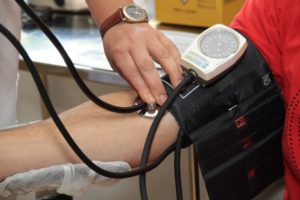
The American Urological Association has shown there are many linkages between weight-related diseases and low testosterone. Men with certain health problems tend to have low testosterone (it is not necessarily causal, but they are very established links)[vi]:
- Overweight men – about 50 out of 100 also have low testosterone
- Men with high blood pressure – about 40 out of 100 also have low testosterone
- Those having high cholesterol – about 40 out of 100 also have low testosterone
- Men having diabetes – about 50 out of 100 also have low testosterone
With diabetes for example, men having diabetes are more likely to have low testosterone. But also, men with low testosterone are more likely to develop diabetes. Consider that testosterone helps the tissues in the body take up more blood sugar in response to insulin. Men with low testosterone often have insulin resistance.
In animal studies, high alcohol intake showed increased aromatization and limited the liver’s ability to get rid of the excess estrogen. And in studies involving men, heavy alcohol intakes boosted estrogen levels in the liver.[vii]
Natural Approaches to Boost Testosterone and Suppress Estrogen
So what’s a man to do?
I ALWAYS SAY DO THE EASY STUFF FIRST!
And that is clearly the lifestyle choices we make about diet, exercise (high intensity/burst training and strength training are best), stress management, sleep, environmental toxin avoidance (minimize endocrine disruptors, stop using plastics around your food!) and healthy living (not smoking, drinking caffeine and alcohol in moderation, etc.). Lose body fat! I recommend a Keto-Green® Diet. Here’s a video I did on the “3 things a gynecologist (ME) want men to know!”
OTHER “EASY” QUICKIES:
- Consuming plenty of zinc. Zinc helps with fertility, immunity, prevention of hair loss, hormone balance, insulin sensitivity and dopamine production which helps with mood, drive and interest. I typically recommend 50-60mg per day. And also suggest foods containing zinc such as oysters (highest level of zinc!), protein-rich foods and fermented foods. Many men have low zinc levels, especially over the age of 60. I often suggest 50-60 mg daily, but definitely discuss with your doctor as to what is right for you.
- Optimize vitamin D levels to a serum blood level between 50-80 ng/ml of Vitamin D 25(OH) – adequate levels of vitamin D help lower sex hormone binding globulin (SHBG), which binds to the testosterone (so it is free to stimulate testosterone receptors and activate testosterone activity). If you are supplementing with D, need to add vitamin K2 as well. Increasing the amount of vitamin D, via supplementation, in the presence of inadequate levels of vitamin K, can increase the risk of calcium deposition in arteries and soft tissue and have a very negative effect on artery elasticity. Studies have shown that men with lower levels of vitamin D (which many men are deficient in!) had lower levels of testosterone and higher levels of SHBG.
- Lowering blood sugar. A blood test measuring this is HgbA1c, ideal level is < 5.3 %
- Eating healthy fats like those found in avocados, nuts, coconuts and seafood
- Increasing your intake of branch chain amino acids which are found in protein
-
Nourish those adrenals: When stress starts to become chronic the body goes into “fight or flight” mode, so testosterone production may lower. A few recommendations that I have that focus on supporting the adrenals include:
- Adrenal adaptogens such as Maca, Ashwagandha, Siberian Ginseng, and Rhodiola rosea. My Mighty Maca® Plus superfoods drink is a great addition to restoring adrenal glands and it is alkalizing, too.
- High quality multivitamin and minerals with bio-available B vitamins and high dose vitamin C.
- Omega 3’s – eat quality omega-3’s such as salmon, oysters, sardines, etc. or supplement with a high quality choice. I like OmegaPure 600EC™ from Xymogen. You can find ordering instructions for Xymogen products here.
- Carnitine: 2000 – 6000 mg per day to improve energy production and mitochondrial function
- Progesterone – men may do well with 5-10 mg of a topical progesterone cream at bedtime, but a little goes a long way…so again, use only with your doctor’s supervision.
- L-Arginine – Arginine is important for Nitric oxide production and should be taken twice daily. (https://www.ncbi.nlm.nih.gov/pubmed/16597191). I usually recommend a slow release arginine supplement made with a beet root powder called Neo40 by Neogenesis or N.O. Max ER by Xymogen.
- Testoplex™ (by Xymogen): I have recommended this supplement for years. It is Xymogen’s formulation to address healthy testosterone levels and provide support for libido and overall vitality. It features mungbean sprout powder.
-
To reduce excess estrogens, Along with a healthy Keto-Green diet, good estrogen lowering treatments are:
- Increasing fiber
- Eat Vitamin B, folate, choline and betaine-rich foods – helpful in supporting methylation, a process in the body which helps metabolize and detoxify estrogens (fish, eggs, spinach, quinoa, beets and shellfish).
- Eat cruciferous veggies – contain lots of glucosinolates which help decrease estrogen activityalong with reducing weight (so the fat doesn’t store the estrogens! Aka man-boobs!) I suggest increasing fiber to assist with detox, as well as bumping up nutrients known to be good estrogen detoxifiers: methylated B12, betaine, choline and methylated folate. These types of nutrients are referred to as methyl donors and help with estrogen metabolism and detoxification.
-
Have your doctor review your medications! Some may induce sexual dysfunction…such as,
- Anti-Androgen drugs: flutamide, GNRH analogues, cytotoxic chemotherapeutic agents
- Psychoactive drugs and mood stabilizers
- Sedative-hypnotics: benzodiazepines, sleeping pills
- Antidepressants: SSRIs, Tricyclics
- Antihypertensive Agents: Hydrochlorothiazide, beta blockers
- Others: Cimetidine (for peptic ulcer), steroids, aldosterone, lovastatin
- Alcohol (sorry!)
BIO-IDENTICAL TESTOSTERONE REPLACEMENT:
I have been prescribing bio-identical testosterone for men (and women) for decades. Consider discussing this option with your doctor. It has been shown to:
- Improve mood and brain function
- Positively impact bone health
- Increase lean body mass
- Reduce prostate size and improve overall prostate health: bio-identical testosterone replacement causes a reduction in PSA, frequency, urgency, dribbling and frequency to urinate during the night
- Result in improvements in sexual function
There are many ways to supplement with it, my preference has been small weekly injections, because creams and gels tend to get on those we love.
Bio-identical hormones are made from natural compounds and identical to our body’s own natural hormones, which mean they are more easily metabolized and utilized by the body without the negative side effects often associated with synthetic hormones.
There are prescription-based bio-identical hormones that are FDA approved, and there are “custom-compounded” bio-identical hormone solutions. This is true for male and female hormone replacement and requires physician supervision.
WARNING – MUST READ
Be cautious though. My biggest disappointment in the age of anti-aging medicine is when practitioners and clients choose to allow testosterone go above physiologic levels mentioned above and when the male is treated without the spouse involved in the treatment plan. This invariably may lead to novelty seeking behavior, or grazing outside their relationship. This is a result of physiology driving behavior. It is the exact opposite of the initial goal of increasing intimacy, love and passion.
Many of these clinics have high divorce rates. I learned early on in my practice to caution clients if they start having any thoughts, feelings or behaviors that aren’t in their nature. I clearly remember one client, I was treating him and his wife, and during his follow up he stated he was having thoughts about women, not his wife, that he didn’t want or need to be having. We stopped the T for a few days and reduced the amount and he felt his devoted self joyfully again.
DHEA:
I have also recommended DHEA supplementation with great success (to both male and female patients). For men it has been found to:
- Reduce bone and muscle loss
- Address/improve skin atrophy
- Reduce adiposity and type 2 diabetes
- Increase memory and cognition
- Improve desire, arousal and orgasm
Generally I recommend 25-50 mg for men depending on tested levels (this needs to be tested/monitored by your physician!).
I used DHEA to help my 79 year old father feel better…it can really be helpful. Talk with your physician as levels should be monitored!
We also currently have men (with very solid egos) using Julva because of its effectiveness!
ANOTHER NOTE ABOUT MACA!
Along with being an adrenal adaptogen…maca has been clinically proven to improve male erection and sperm production and motility. Boosts strength and stamina, and boosts libido. Improves athletic performance, fatigue issues and memory!
Maca also has a high concentration of histidine, which aids in orgasm and ejaculation.
OXYTOCIN - Our Hormone of Love and Bonding:

The most important hormone we have is Oxytocin. The hormone of love, bonding and connection which add to the feeling of a peaceful life well lived and loved. I want that for all of you.
Read this article about natural ways you can increase your oxytocin! (and cuddling, loving...and enjoying your partner are on the list!)
Just remember, your testosterone levels are about more than just sex.
The important thing is to talk with your doctor about your testosterone and estrogen hormone levels, get tested and determine what options would be best for you and your overall health!
Print out this article and discuss it with your doctor...there are many things you can do!
References:
[i] Moffat SD. Effects of testosterone on cognitive and brain aging in elderly men. Ann NY Acad Sci. 2005 Dec;1055:80-90
Beauchet O. Testosterone and cognitive function: current clinical evidence of a relationship. Eur J Endocrinol. 2006 Dec;155(6):773-81
[ii] https://academic.oup.com/jcem/article-lookup/doi/10.1210/jc.2006-1375
[iii] Diabetes Care. 2013 Sep; 36(9): 2591–2596.
[iv] J Cell Biochem. 2007 Nov 1;102(4):899-911.
[v] http://drmasley.com/heart-health/does-testosterone-decrease-or-increase-heart-disease-in-men/
[vi] https://www.urologyhealth.org/urology-a-z/l/low-testosterone
[vii] Purohit V. Can alcohol promote aromatization of androgens to estrogens? A review. Alcohol. 2000 Nov;22(3):123-7.Colantoni A, Emanuele MA, Kovacs EJ, Villa E, Van Thiel DH. Hepatic estrogen receptors and alcohol intake. Mol Cell Endocrinol. 2002 Jul 31;193(1-2):101-4.
Cohen PG. The hypogonadal-obesity cycle: role of aromatase in modulating the testosterone-estradiol shunt–a major factor in the genesis of morbid obesity. Med Hypotheses. 1999 Jan;52(1):49-51.
Rebuffé-Scrive M, Mårin P, Björntorp P. Effect of testosterone on abdominal adipose tissue in men. Int J Obes. 1991 Nov;15(11):791-5.
